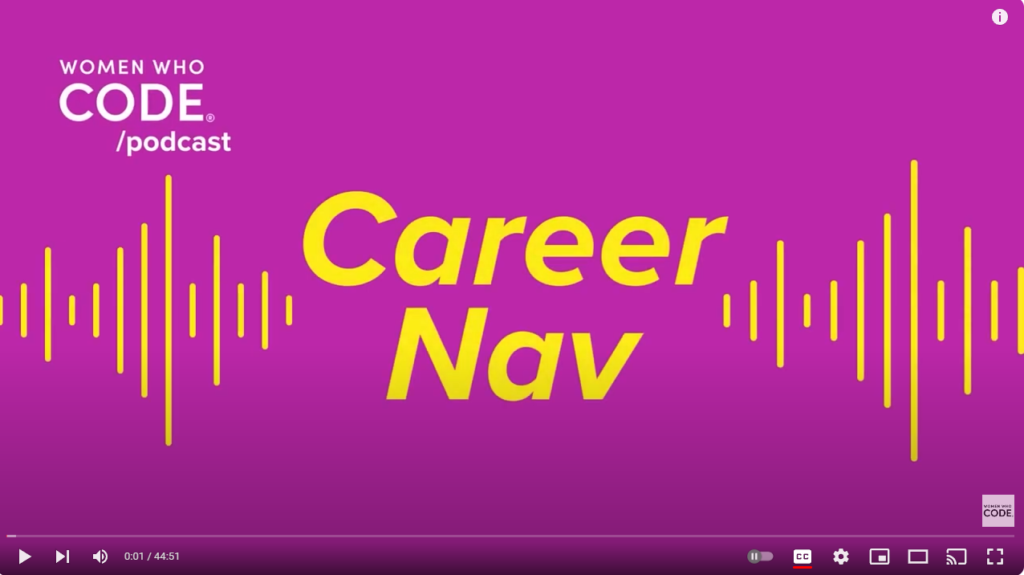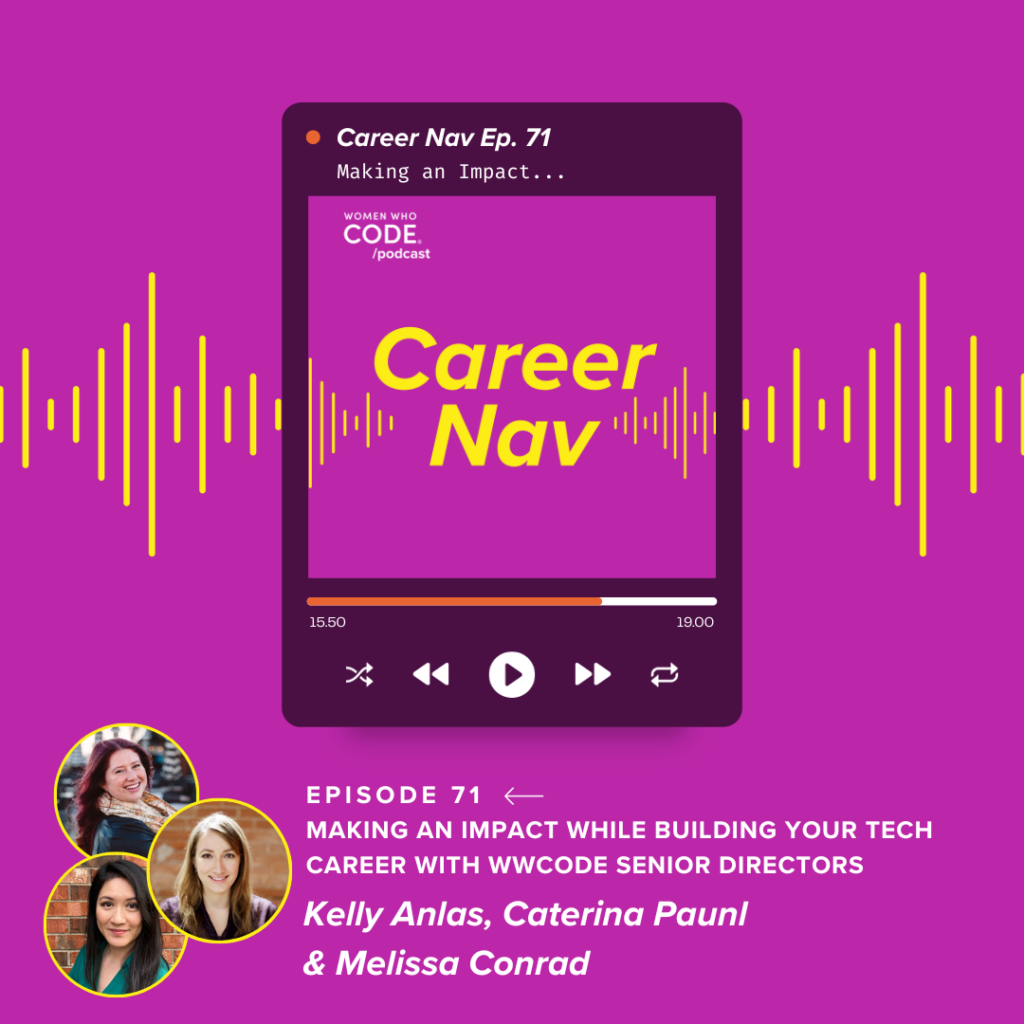Career Nav #71: Making an Impact While Building Your Tech Career With WWCode Senior Directors
Written by WWC Team

iTunes – Spotify – Google – Video – More Episodes
Shanna Gregory, Chief Program Officer at Women Who Code, sits down with some Senior Directors at Women Who Code to discuss their leadership roles in volunteering. Joining her is Kelly Anlas, Engineering Manager at Paxos, Melissa Conrad, Full Stack Developer at Mor Furniture for Less, and Caterina Paun, Computer Science Professor at Portland State University. They talk about skills and opportunities gained through their volunteer work.
Share the skills you’ve gained in volunteering that you haven’t had the chance to build earlier in your career.
KA: I’ve been an engineering manager officially for around five years and unofficially a little bit longer. I’ve been involved in various volunteer activities, which set me up for success. Conflict management comes to mind both as a Women Who Code director and I also taught a Girls Who Code class one summer. I’ve used that in interviews, which I recommend to people when they’re considering volunteering with Women Who Code. You can use your experiences here, especially as a manager, to deal with people.
MC: I have improved leadership, speaking, and networking skills. My current daytime job is remote. Being able to volunteer connects me with people that I would not normally have met.
CP: Conflict resolution is a big one. Event organization is another one. It’s been fun to put a lot of different types of events together. We’ve done hackathons talks, and hosted speakers. There are a lot of opportunities to do cool things.
How has giving back opened up opportunities for you within your career?
MC: When I attend an event or host an event, and I hear about other people’s journeys, it inspires me. It inspires all the career possibilities or different activities that we can do. I’ve met so many influential people. All these people have been so supportive and so kind, and they’re always offering to help with resources and to answer questions. Sometimes, these connections make other connections, and that always helps with every group that I volunteer for. You never know what those connections can bring.
CP: I have volunteered with Women Who Code for almost ten years. I have met a lot of people that I have worked with at one point or another. I have my full-time job, but I’ve also done consulting on the side. There have been a lot of consulting opportunities that have come through people that I’ve met at different events. Women Who Code also started my experiences with public speaking.
KA: Public speaking is not something that I struggled with earlier on in my life. Virtual public speaking was horrible. I led so many events virtually that I joke now that nothing could happen that would stress me out at this point. That has made me so much better at interviews. I’m doing a better job of representing myself.
How are you finding the balance between volunteer community commitments and professional responsibilities?
CP: Balance is always hard. It is another thing that you can practice. The more times you overextend yourself, the more you learn, and then you do less. A big part of it is building a team and leaning on members of that team. One of the things we stress a lot in Portland is that we don’t want you to spend years as a volunteer. We want you to become a leader. It’s important for the strength of our overall team that people can feel empowered to take something on. It makes it easier overall regarding the time commitment for our directors because we are sharing the load. That’s probably been the easiest thing in terms of finding more balance, learning to work together, and collaborating on various things.
MC: I agree. As we onboard new leaders, we understand that you are a volunteer, and we are aware that other things are going on. The more people we bring on board, the more that we could share the workload and see what the volunteers’ goals are and how we can support them.
KA: Delegation is the number one answer, but a good skill set for people to build is prioritization. When you’re earlier in your career, you’re only given as much work as you can, and you are expected to get all of it done. I could show you the list of things on my to-do list today that did not get done, and a lot of them were important things. You have to make decisions about what is worth your time and what is going to give you results, and adding volunteer opportunities is the same thing. It’s delegation, prioritization, and the learning to accept that you will not get everything done, and that’s okay.
How are you setting personal goals of remembering why you’re volunteering?
KA: For me, it will always be people. I’m not interested in doing anything in a box by myself, I want to be working with people. I encourage other leaders to schedule time with the people ask them questions, like how are they doing? What are they like? What are their pain points? Connect it back to people. As for goals, if the goals are going to help you do the things that you want to be doing, then they’re beneficial. Otherwise, it’s not about the goal. There are just opportunities. What are the opportunities that feel motivating? What will I feel like really good having achieved?
MC: I love meeting with people and seeing their goals and how I can support them. What are they passionate about? Because if someone doesn’t have that drive, it’s really hard to reach that goal. Once we figure out that goal, we set a date, which drives me. I like numbers. I like order.
CP: In terms of goal setting, both with work and also with Women Who Code, something that’s helped me is to understand what it is that I want to accomplish. What is it that I need to prioritize in terms of accomplishments? What do I want to be proud of at the end of this period? Once you have narrowed down your code, it’s easier to figure out what areas you want to prioritize and where you want to put all your time.
How can people give back? What are a few examples of giving back when you’re not ready to be at that senior director level yet? Or, on the flip side, if you want to give someone a pep talk to jump in and push themselves out of their comfort zone, that works, too.
KA: There is no expectation that you have to be an expert to do something. We have this sense that to succeed in our careers and to succeed in these places. We need to be led by someone who’s in front of us. That’s not reality. I’ve never had an actual mentor or someone who was in front of me, leading me along. I would create things for the people with me and for us to move forward. You just need to combine it and bring different minds and ideas together. The most important aspect is just being willing to do things.
CP: Being willing to help with an event, being willing to put something together. It benefits the person doing all of the work because of getting the experience. It also really benefits our community because so many people get to participate in those events and learn.
MC: Yes, I would like to add socializing and trying to get past that initial, “Hi, this is my name.” Keeping that conversation going. Ask your questions in group chats. Answer questions and share resources. It builds that camaraderie and just the insight and the resources that are there to help each other.
***************
Video: https://youtu.be/0MXq0Klrkvc
Guest: Shanna Gregory, Chief Program Officer at Women Who Code
Guest: Kelly Anlas, Engineering Manager at Paxos
Guest: Melissa Conrad, Full Stack Developer at Mor Furniture for Less
Guest: Caterina Paun, Computer Science Professor at Portland State University
Producer: Kimberly Jacobs, Senior Communications Manager @ Women Who Code
